Subhanallahi Wa Bihamdihi Adada Khalqihi Meaning, Arabic, and Hadith
Subhanallahi Wa Bihamdihi Adada Khalqihi is a short yet powerful words of remembrance of Allah.
Advertisements
This supplication is to be recited three times in the morning according to the authentic Hadith. Find out the meaning and simple explanation of this supplication.
Subhanallahi Wa Bihamdihi Adada Khalqihi Meaning In English
Subhanallahi Wa Bihamdihi Adada Khalqih means Glory is to Allaah and praise is to Him, by the multitude of his creation, by His Pleasure, by the weight of His Throne, and by the extent of His Words.
Subhanallahi Wa Bihamdihi Adada Khalqih In Arabic Text
سُبْحـانَ اللهِ وَبِحَمْـدِهِ عَدَدَ خَلْـقِه ، وَرِضـا نَفْسِـه ، وَزِنَـةَ عَـرْشِـه ، وَمِـدادَ كَلِمـاتِـه
Transliteration
The transliteration of this zikr is Subhaanallaahi wa bihamdihi: ‘Adada khalqihi wa ridhaa nafsihi, wa zinata ‘arshihi wa midaada kalimaatihi.
Advertisements
Subhanallahi Wa Bihamdihi Adada Khalqihi Hadith
Juwairiyah (radhi Allaahu anha) reported that one day the Prophet, peace be upon him, left her apartment in the morning as she was busy observing her dawn prayer in her place of worship.
He came back in the forenoon and she was still sitting there. The Prophet, peace be upon him, said to her, “You have been in the same place since I left you?”
She said, “Yes.” Thereupon the Prophet, peace be upon him, said, “I recited four words three times after I left you and if these were to be weighed against what you have recited since morning these would outweigh them, and these words are:
Subhaanallaahi wa bihamdihi Adada khalqihi wa ridhaa nafsihi, wa zinata ‘arshihi wa midaada kalimaatihi.
Muslim 4/2090
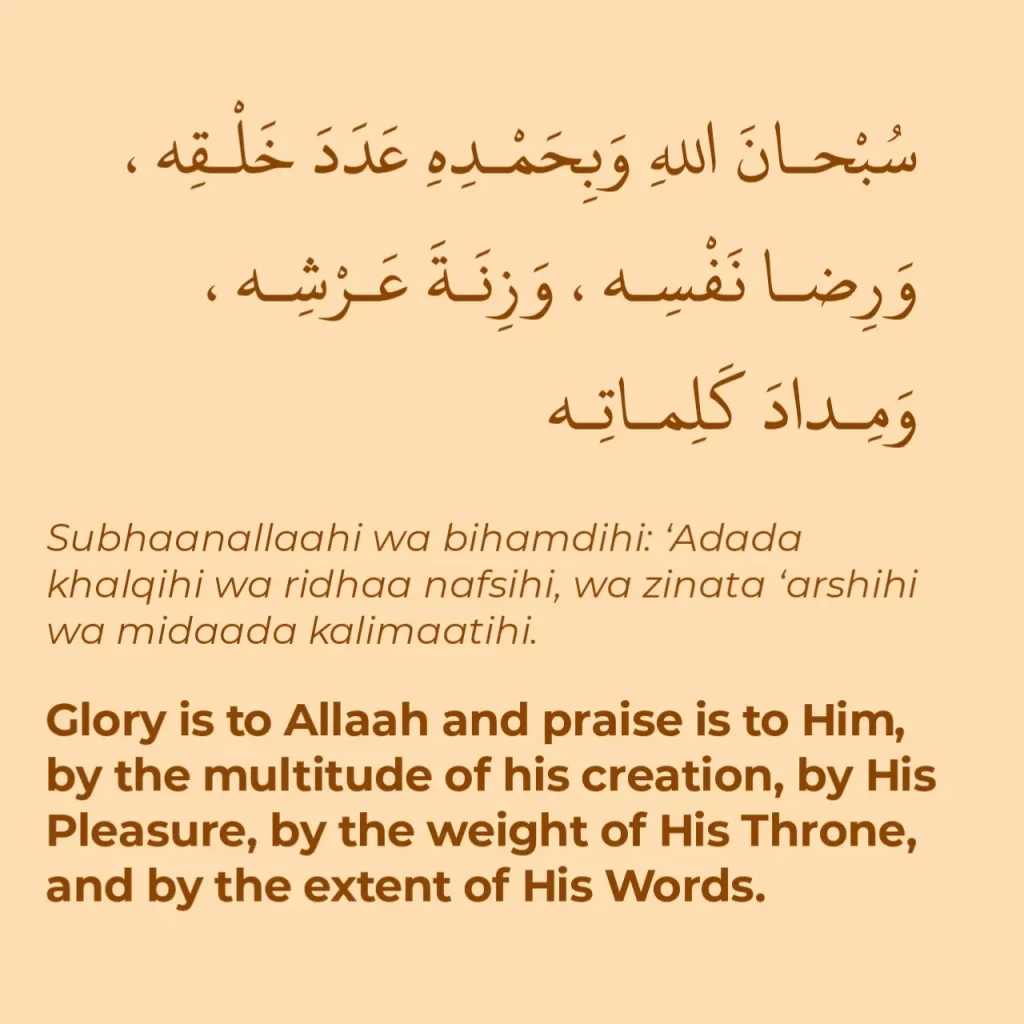
- Read also, 7 Best Duas In Sujud
- Dua For Sneezing, Its Reply in Arabic, and English Meaning
- Dua For Bad Thoughts
Meaning And Simple Explanation Of The Hadith
This is one of the hadeeths that explains the excellence of one of the forms of remembrance of Allah.
It is what was reported by the mother of the Believers Juwayriyyah bint Al-Harith that the Prophet SAW left her at the time of the Fajr prayer and returned to her in the forenoon, while she was doing the Tasbeeh and the Taheel.
So, he SAW explained to her that he had recited some words after he left her which are weightier than what she had been reciting since dawn or morning:
- “Subhaanallaah wa bihamdihi, ‘adada khalqihi” (Allah is free from imperfection and I begin with His praise, as many times as the number of His creatures) three times.
- Subhaanallaah wa bihamdihi rida nafsihi” (Allah is free from imperfection and I begin with His praise, in accordance with His good pleasure) three times.
- “Subhaanallaah wa bihamdihi zinatah arshihi” (Allah is free from imperfection and I begin with His praise, equal to the weight of His Throne) three times.
- “Subhaanallaah wa bihamdi midaada kalimaatih” (Allah is free from imperfection and I begin with His praise, equal to the ink that may be used in recording the words (for His Praise)) three times.
Allah is free from imperfection and I begin with His praise, as many times as the number of His creatures, in accordance with His good pleasure, equal to the weight of His Throne and equal to the ink that may be used in recording the words (for His Praise).
As for “Subhaanallaah wa bihamdihi adada khalqihi,” the meaning is that you glorify and praise Allah, the Mighty and Sublime, as many times as the number of His creatures.
Advertisements
And none knows the number of the creatures of Allah, the Mighty and Sublime, except He. Allah – the most High – states: “And none can know the hosts of your Lord but He.” [Al-Muddaththir: 31].
As for “Subhaanallaah wa bihamdihi zinata arshihi”, none knows the weight of Allah’s Throne except He, Blessed be He and the most High, because it is the greatest creation known to us.
The Prophet SAW reported from Him that He said, “The comparison of the seven heavens and the seven earth to the Kursi is like a ring thrown onto a desert.
Advertisements
And the superiority of the Arsh (throne) over the Kursi is like the excellence of the desert over this ring.” Hence, it is a great creation; none knows its magnitude except Allah, the Mighty and Sublime.
As for “Subhaanallaah wa bihamdihi rida nafsihi,” it means that you glorify and praise Allah with words of praise which Allah, the Mighty and Sublime, is pleased with.
And whichever words of praise Allah is pleased with is the best of praise and most complete.
As for “Subhaanallaah wa bihamdihi midada kalimatih”, ink is used for writing and nothing is comparable to the words of Allah.
There is no limit to the Words of Allah, the most High. So, the important point is that it is pertinent for us to keep reciting this word of remembrance.
Taken from explanation of Riyadus Saliheen by Ibn Uthaimeen
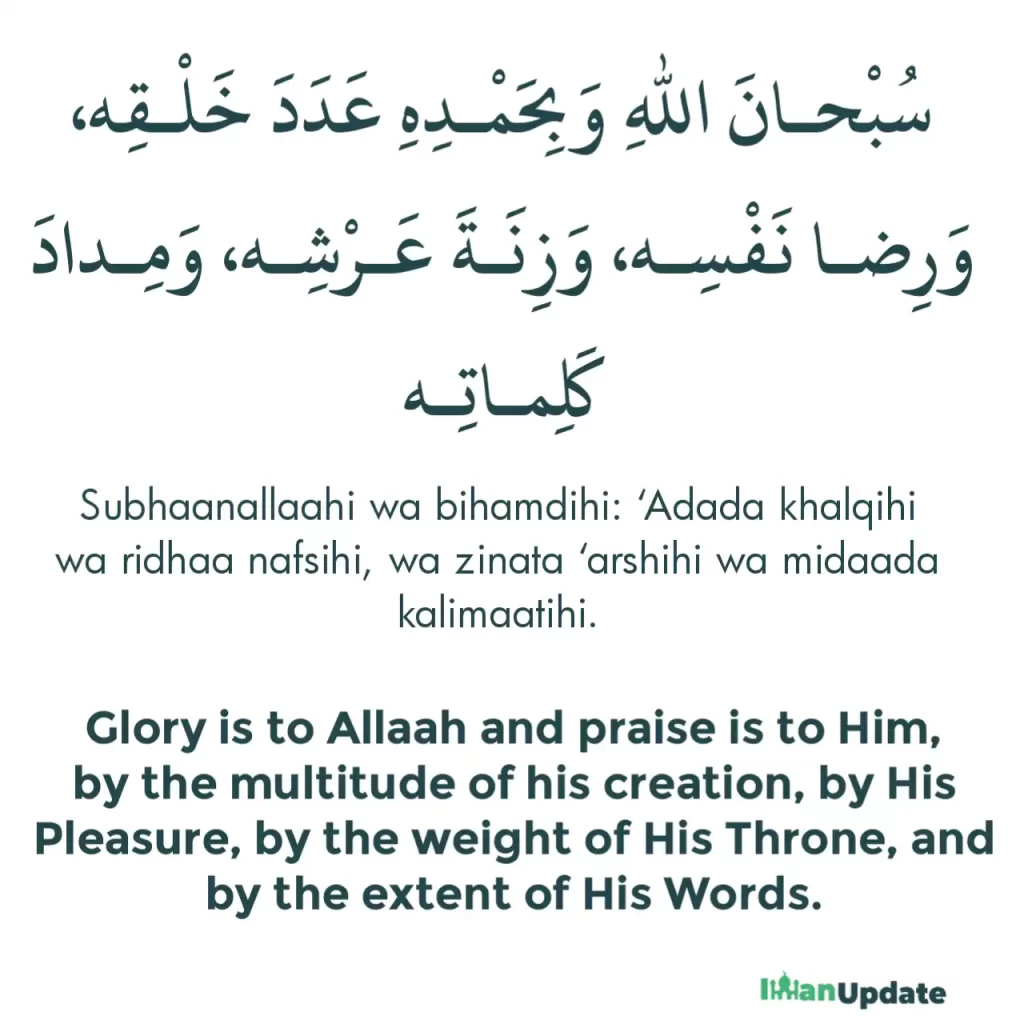
At Fajr, the messenger of Allah (SallaAllahu alayhi wasallam) left the house of his wife Juwairiyah, who was in her place of prayer [remembering Allah].
When he returned after sunrise, she was still in the same position, so he asked her, Are you still in the same condition as I left you?
She said yes, so the prophet SAW replied, “After I left you, I said four words three times.” If they were weighed against [all] of what you said today, they would win.
Glory is to Allah is a manner of thanking Allah and freeing Him from any shortcomings, therefore we begin the dua by glorifying Allah by denying any shortcomings in Him.
We follow this by praising Allah in its entirety, which includes praising Him for the qualities He possesses as well as for the good He has done for us.
When we say we worship Allah and praise Him because of the abundance of His creation, we are not claiming we are praising Allah this many times, because it is impossible to say I am praising Allah x number of times without actually doing so an x number of times.
When we say that we glorify and praise Allah for the quantity of His creation, we mean that He deserves to be glorified and praised for this much, and more, because His creation is always increasing.
Nothing exists outside of Allah’s creation, hence He deserves to be glorified and praised an infinite number of times.
Allah is the Most Noble, and He only accepts and is pleased with excellent things; hence, when we glorify and praise Allah by His pleasure, we are stating that He deserves to be glorified and praised in the finest way possible, because He is only pleased with good things.
Another interpretation of this sentence is that when Allah is pleased with anything, He rewards it with the finest possible reward, hence His pleasure is a magnificent and noble thing.
Allah’s throne is the heaviest of all creation.
We already read in the ayatul kursi commentary that the prophet (SallAllahu ‘alayhi wasallam) stated,
The heavens (universe) in comparison to the footstool are but like a ring in an empty desert, and the example of the footstool in comparison to the throne of Allah is like this ring in the empty desert
Because the throne is the heaviest and largest object, we are implying that Allah merits the most extensive and weighty form of glorification and praise.
The “quantity of His creation” dealt with the quantity of this praise, “His Pleasure” dealt with the nobility and goodness of this praise, and “the weight of His throne” dealt with the size of this praise, so Allah deserves to be glorified and praised as much as possible, an infinite number of times.
The “extent of His words” incorporates all three elements because Allah’s words are endless, the best of words, and the most powerful.
Allah describes their greatness in the Qur’an.
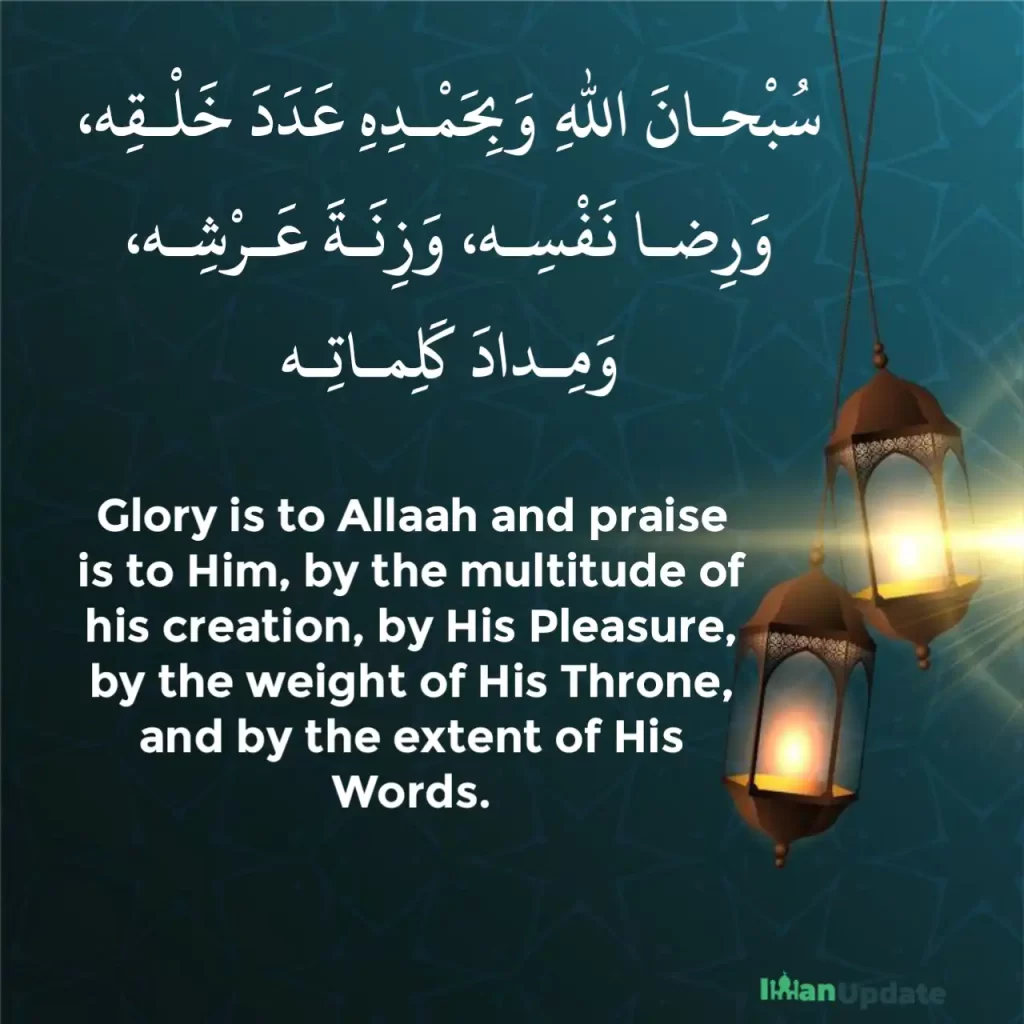
Point To Consider
This dua is fairly short, yet it has a great rewards.
Although Juwairiya (radhiyaAllahu ‘anha) most likely uttered it more than three times that morning, and added many additional kinds of remembrance of Allah on top of that, the prophet (SallaAllahu ‘alayhi wasallam) declared that what he did was much better.
The difference between the two is that the word of remembrance he made examined the greatness of what Allah deserves, which opens up the heart to meditate on Allah.
This makes Allah to be remembered not only in the speech, but also in the heart.
The stronger your heart’s presence when remembering Allah, the bigger your reward.
Never skip reciting this supplication three times every morning, and always say it with thought to maximise the rewards you receive.
The Messenger of Allah, may peace be upon him, has made it clear that a Muslim’s repetition of the remembrance of Glory be to God and his praise is the number of his creation and its repetition three times, is equivalent to a Muslim sitting in his prayer place and perpetuating the remembrance of God – the Almighty – from after the dawn prayer to Beyond.
That is, with what weighs the greatness of the stature of the Throne of the Most Merciful, and that the greatness and weight of the Throne is known only to Allah.
It is known that the Throne is the greatest of creatures.
Subhanallahi Wa Bihamdihi Adada Khalqihi Benefits
A wise and true believer cannot pass on a hadith from the authentic Sunnah of the Prophet, without thinking about its benefits and lessons learned from it.
This beautiful hadith mentioned, and the following is mentioned:
- Religion is ease and not hardship, and the Prophet may peace be upon him, indicated that certain words said in a short time, and with complete ease, weigh the remembrance of long hours.
- Allah’s words are something completely different from Allah’s creation; As the Prophet, may peace be him peace, differentiated between them.
- The words of Allah SWT cannot be counted by one of the human beings, and what this confirms in the Holy Qur’an.
Advertisements

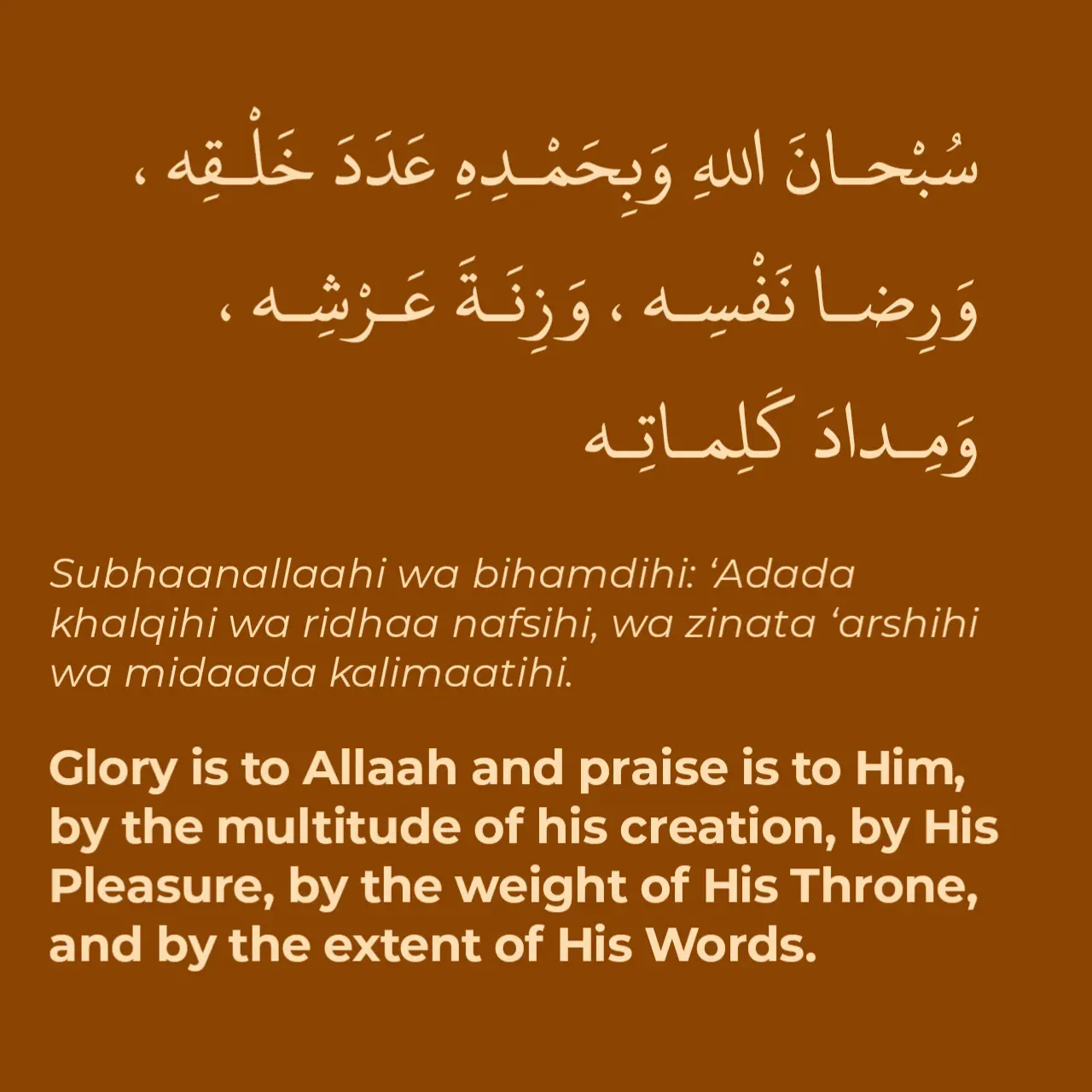
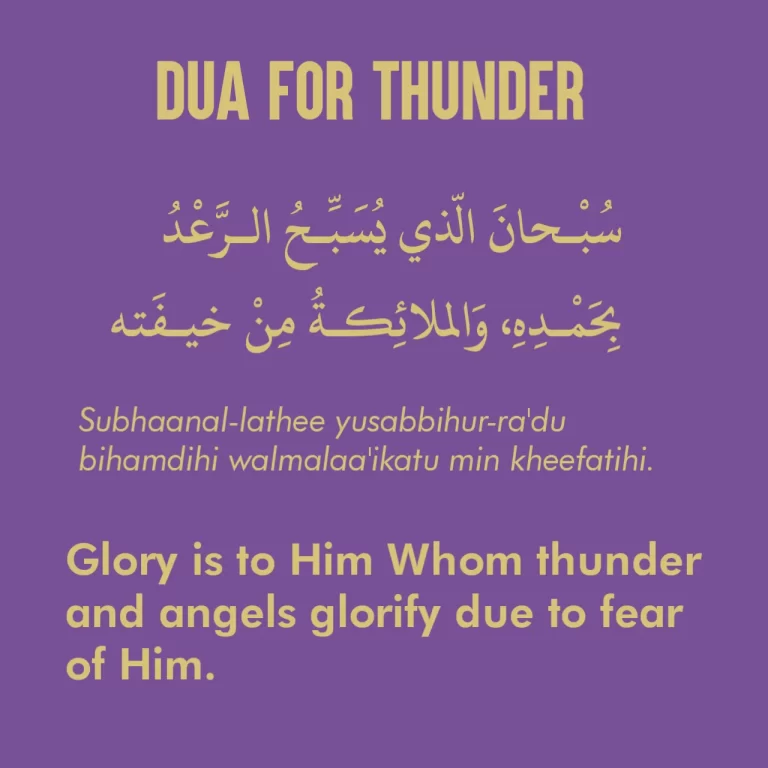


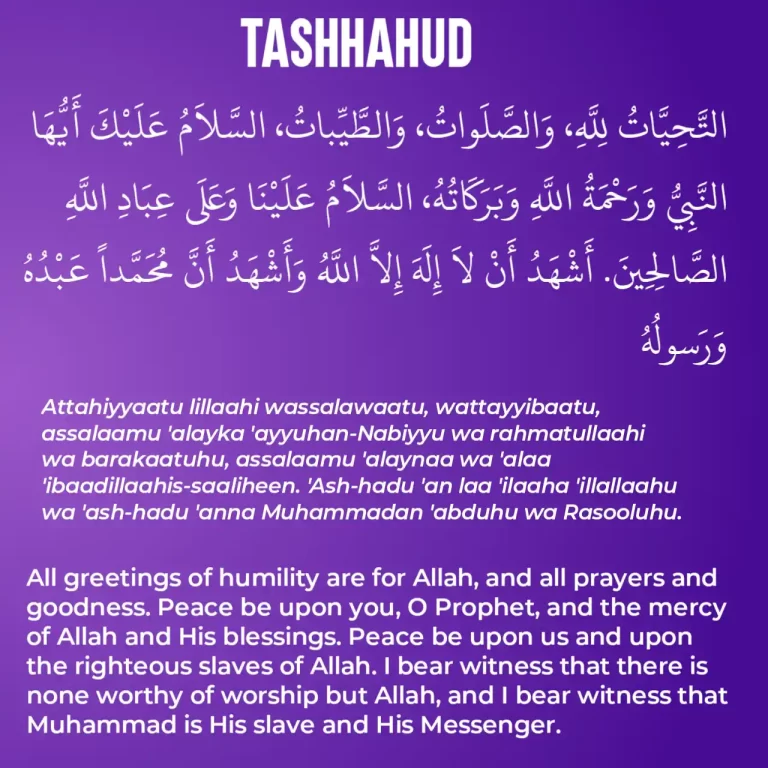
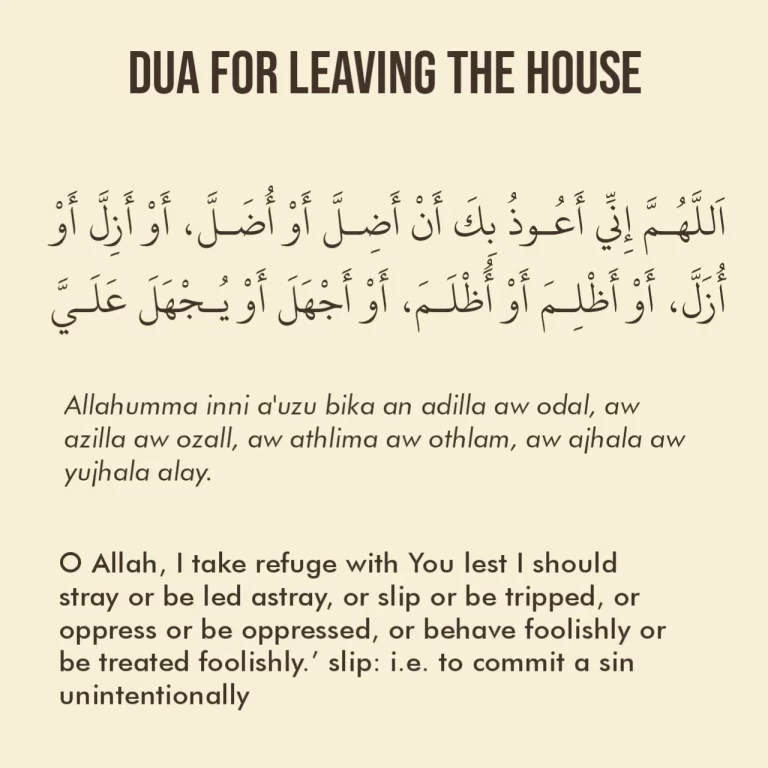

3 Comments